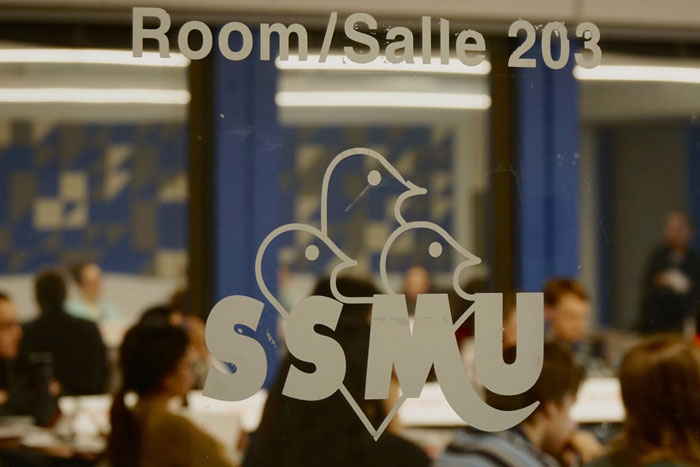On April 6, the Students’ Society of McGill University (SSMU) Legislative Council held its last meeting of the term. During this meeting, the Council passed a motion to advocate for changes to the McGill Code of Student Conduct and Disciplinary Procedures, addressed concerns surrounding the role of the Board of Directors (BoD), and discussed proposals evaluated by the Library Improvement Fund Committee (LIFC).
Motion to Advocate for Changes to the McGill Code of Student Conduct and Disciplinary Procedures to Support Survivors
The Motion to Advocate for Changes to the McGill Code of Student Conduct was moved in response to an article by The McGill Tribune titled “It doesn’t matter because it didn’t happen on campus,” published on April 4.
“A student at McGill was assaulted by another student and the McGill administration did not act to protect the survivor of the assault,” SSMU Clubs Representative Adam Templer said. “They claimed that this is a result of the specific limitations within the Code of Student Conduct and Disciplinary Procedures.”
The motion, which was passed unanimously, seeks to increase SSMU’s role in changing what circumstances fall under the McGill context in the Code of Student Conduct and to prevent a similar incident from happening in the future.
“[We are] trying to mandate next year’s executive team to take action in consultation and cooperation with the next year’s senators in order to push forward the creation of a committee involving students and faculty, to properly revise and address the Code of Student Conduct and Disciplinary Procedures,” Templer said.
Templer is disappointed in how the McGill administration handled the situation, in which McGill took little action to prevent the perpetrator of the assault from being in contact with the victim on campus.
“What happened is completely unacceptable and the survivor was let down, and frankly this reflects poorly on the entire McGill community by the actions of the administration,” Templer said.
Vice-President (VP) University Affairs Erin Sobat encourages students to have a say in any revisions that will be made to the Code of Student Conduct and Disciplinary Procedures.
“The code is scheduled for review this fall,” Sobat said. “There’s also a number of other policies that are up for review in part of the context of the Policy Against Sexual Violence […] so ideally there should be a number of opportunities for student input as to what those changes look like.”
Library Improvement Fund Guest Speaker
According to Malcolm McClintock, the LIF commissioner, a majority of the student feedback from the 2016-2017 year called for having more accessible food options, consistent temperature control in the libraries, increasing the amount of study areas and relaxation space, and adding more outlets and charging devices.
There were certain requests asked for in student surveys that could not be provided by LIF, such as reopening the second entrance at the Redpath Library, as this would require hiring additional security. Other proposals that were rejected included implementing standing desks and sleep areas.
McClintock also addressed the progress of the Fiat Lux, a project to upgrade the Redpath-McLennan complex and to add a collection storage unit underneath the lower field.
“It’s been in the works for about two years, and I really think we need to start getting students’ voices in there because if we’re not smart about this, we might not be able to build the library that best represents us necessarily,” McClintock said.
Board of Directors Guest Speaker
The Board of Directors, the highest governing undergraduate student body at McGill, is in charge of supervising the management and affairs of SSMU.
According to Chloe Rourke, chair of the Board of Directors, a recurring problem is the Board not holding SSMU executives responsible for their actions.
“Complaints that were made by executives against executives were always mitigated by other executives,” Rourke said. “There was no higher body that would intervene, […] and if a complaint was made against a president, there was really no [governing] body that was able to hold them accountable.”
So far, no solution has been found to address this problem, but the Board is open to broad consultation with the community for potential solutions or ideas.









